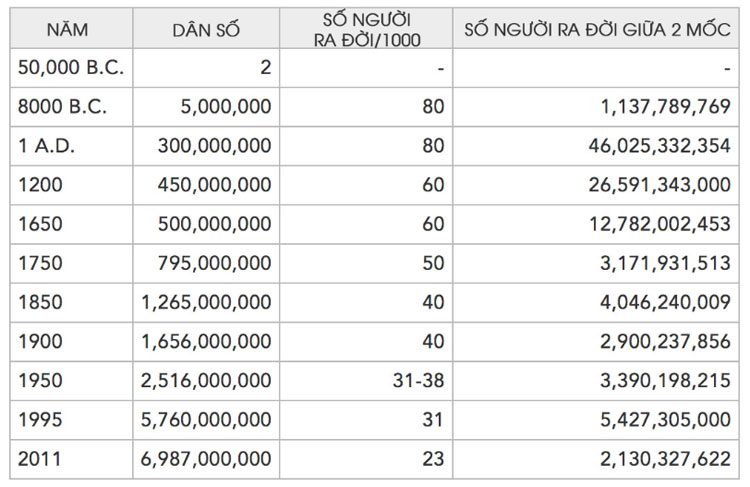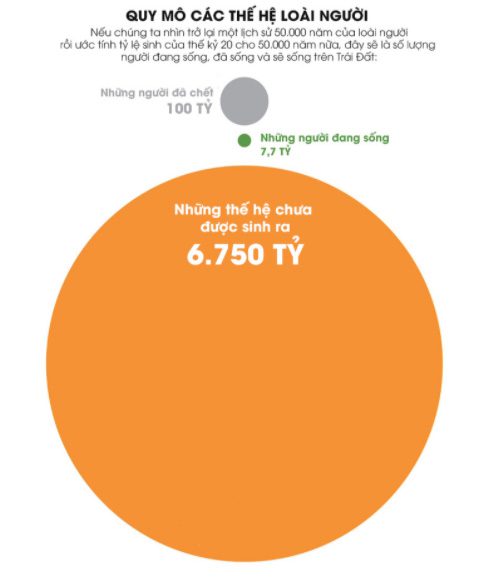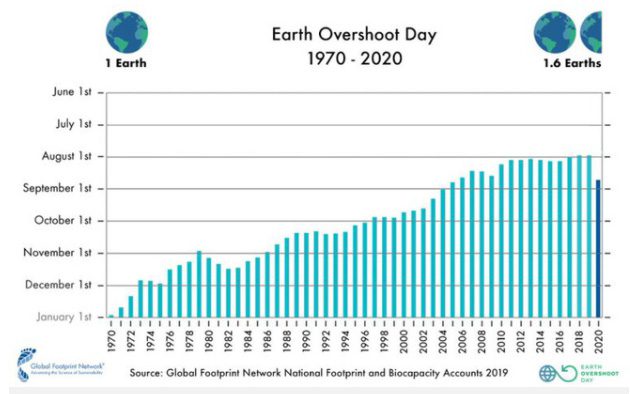Will We Become Worthy Ancestors for Future Generations?
The world currently has 8 billion people, and you are one of them. But have you ever wondered: How many people have ever lived on this Earth, and how many more will be born in the future?
Estimates published in 2015 by the U.S. Census Bureau indicate that throughout history, approximately 108.2 billion people have been born on Earth, with 100.2 billion having died, leaving “only” about 8 billion currently living.
In other words, the number of dead exceeds the number of living by 14 times, and we are among the nearly 7% of all people who have ever lived on this planet; the remaining 93% have passed away. In a humorous assumption, if all of them turned into zombies or ghosts, they might outnumber the living in just a few short minutes.
That’s quite a staggering number, isn’t it? But the number of people in the future, our descendants in about 50,000 years, will likely overwhelm you even more.
Contemplating that figure suddenly forces us to reflect on our current way of life. Are we a sinful generation, destroying the planet while being unaware that we hold the fate of countless others in our hands?

The number of dead exceeds the number of living by 14 times, and we are among nearly 7% of all people who have ever lived on this Earth.
How Many People Have Ever Lived on Earth?
So how do researchers come up with these estimates? First, the Population Reference Bureau (PRB) sets 50,000 B.C. as the starting point. This is when modern Homo sapiens emerged. Scientists debate this timeline, as some believe humans began appearing on Earth millions of years earlier. However, the 50,000 B.C. mark has been selected by the PRB and many other major organizations.
Of course, the number of people born after that was also estimated by researchers based on gathered information. Initial life expectancy was quite low due to a lack of medical conditions, food issues, climate changes, and inter-human violence, among many other problems, causing the population growth rate to be quite slow in the early phases. At that time, the infant mortality rate reached as high as 500 out of 1,000 or more. Below is a detailed overview of the world’s population over different periods.

The global population situation over different periods.
Interestingly, we can see that the population growth rate from year 1 to 1650 was quite slow due to the impact of the bubonic plague. During the Industrial Revolution to the present, the population began to explode. From 1850 to now, the world population has increased sixfold. Of course, these are only relative estimates based on growth rates, birth rates, and various influencing events. However, they provide some insight into humanity’s historical development from ancient times to now.
It is estimated that from now until 2050, the world will welcome approximately 1 to over 2 billion more people, bringing the total human population to a maximum of 9.8 billion. By then, there will have been 113 billion people who have ever lived on Earth.
But Both Our Ancestors and We Are Just a Tiny Part Compared to Humanity’s Future
On the arrow of time, even though humanity has yet to set foot on or build a new society on Mars, we will always occupy our own future here on Earth. And it seems that future will become increasingly crowded.
If we use the year 2020 as a benchmark to depict a future equivalent to the time from now back to 50,000 years ago, the estimated birth rate suggests that approximately 6.75 trillion people will be born. Even in the next millennium, the number of new members of our planet could exceed the total number of people who have ever lived on Earth.
135 billion children will be born from now until the year 3020. We will become the distant ancestors of those children, similar to how we view the kings of the Ly dynasty today. The question is whether we can live in a manner worthy of being their ancestors so as not to become a generation of historical sinners.

In 1987, in the book “Reasons and Persons”, author Derek Parfit, a British philosopher, presented a scenario. Imagine someone hands you a bow and arrow and tells you that you must shoot into a forest ahead. If the forest is close enough for you to identify a person present within it, you would feel guilty about releasing your arrow.
However, if the forest is far away, and you cannot know who is in it, as you release the bowstring, you are less likely to feel remorseful about your action. This applies not only to geographical distance but also to temporal distance.
For instance, if you were on a bus full of children and a terrorist demanded that you place a bomb to detonate that bus, of course, you would refuse to comply at that moment. Even if the killer said the bomb would go off in 10 minutes, you would not set it, nor would you if it were 10 days or 10 years later when those children have grown up.
But let’s consider what we are doing to the generations of children who will be born in the next 500 or even 1,000 years. We know that the radioactive waste and plastic we are currently dumping could fill the oceans and pose dangers for centuries to come, yet because those futures are far off on the timeline, we continue to stockpile plastic and radioactive waste for future disposal.
A future Earth will still have people, possibly many people. Yet we seem unaware of this. What we are doing today resembles what the British colonizers did to the Indigenous people of Australia. We view the future as a distant colonial outpost, a place devoid of inhabitants.
A doctrine called terra nullius or “land belonging to no one” allowed British colonizers to treat Australia as if there were no Indigenous peoples living there. As a result, Indigenous Australians continue to struggle against the legacies of terra nullius.
On the arrow of time, our generation living in the 20th and 21st centuries may also be applying a similar doctrine called tempus nullius – “time belonging to no one”. We treat the planet as if there will be no one living there in 1,000 years.
According to social philosopher Roman Krznaric, our generation is usurping the Earth from future descendants, turning them into time colonized slaves—people who will essentially have to deal with what we leave behind, from public debt and technological risks to nuclear waste, microplastics, and ecological degradation.
Biological studies estimate that, on average, a mammal species can exist for about 1 million years before extinction. However, these studies certainly exclude humans. We do not consider ourselves equal to other species.
Yet in the 3.8 billion years of accumulated wisdom from nature, most animal species understand that if they want to care for their offspring, they must also care for the environments in which their young will thrive. This understanding has allowed every creature, from owls to otters, to survive from generation to generation.
Most animals live only within their ecological limits; they do not venture far from their nests and do not destroy their habitats. Humans, on the other hand, use resources faster than the natural environment can regenerate, emitting greenhouse gases into the atmosphere at levels higher than the planet can absorb.
The Global Footprint Network (GFN) has established a concept called Earth Overshoot Day. This is a moment in the year when we exhaust the entire amount of food, timber, fiber, and carbon that the planet can regenerate in a year.
In ideal conditions, Earth Overshoot Day should fall on December 31, or even into the new year. This would mean that humanity is using just enough resources or even saving them for future generations.

In 1970, when the concept of Earth Overshoot Day was first introduced, that milestone fell on December 29, approaching the ideal level. Humanity had the opportunity to push Earth Overshoot Day further back, yet history shows that we have actually been pushed back instead.
In just three years, Earth Overshoot Day has been pushed back by a month. This means that by the end of November 1973, humanity had consumed the entire year’s worth of resources.
The milestone continues to be pushed back. Over the past 50 years, Earth Overshoot Day has been occurring earlier each year, and this year, it is projected to fall on August 22, indicating that we will have exhausted our resources for the nearly four remaining months of the year.
The telling numbers show that with each passing year, our generation consumes resources that should be reserved for the following year and for the generations to come.
The question now is: how do we stop this?
In some countries like Finland and Sweden, the governments have implemented top-down solutions. They have established advisory groups for parliament and the government known as “Future Councils.” These groups work within the Prime Minister’s office or Parliament to consult on strategic policies for sustainable development.
In Hungary, there is also a group called “Inspectors for Future Generations.” Their mission is to “review legislative actions, monitor policy development, and legislative proposals to ensure they do not pose a serious threat to the environment or harm the interests of future generations.”
Additionally, there are many civil society organizations working on environmental protection at various levels, from local to international. However, regardless of the approach, achieving success will require changing the mindset of each individual among the 7.7 billion people.
We all feel that only a collective effort at a human level can protect the environment on a planetary scale, safeguarding a sustainable Earth for our descendants. The challenge is that achieving this is genuinely difficult.
The difficulty arises not only from a lack of access to information and awareness about sustainable development but also because humans are not purely rational beings. Much of the information we hear often goes unheeded, such as plastic waste pollution, declining air quality, or even Earth Overshoot Day…
These purely scientific and philosophical pieces of information are often absorbed less and drive action less effectively than emotionally charged information, such as images of marine life being killed by plastic waste dumped into the oceans.
To foster long-term thinking that counters human psychological instincts, we need approaches and arguments that inspire and target the irrational parts of our brains.
For instance, while reading this article, you can use your imagination to visualize the entire history and future of humanity. Thomas Suddendorf, an anthropology professor at the University of Queensland, notes that humans are the only species capable of imagining a “complex dramatic scene” in their minds.
We have used our imagination to create literary works, films, and plays. Part of our world exists solely in our imagination, a parallel reality that historian Yuval Harari calls “dual reality,” which has enabled Homo sapiens to dominate the planet, if not destroy it.
Imagination can serve as a helpful tool alongside science and philosophy in the pursuit of sustainable development, similar to the MÄori people of New Zealand, who have embedded in their consciousness a concept called whakapapa.
Translating from MÄori, whakapapa means genealogy. It is an imaginative system that connects all living people and those who have died through generations of humanity, set within a world without boundaries of time and space.

You can imagine whakapapa as all of us, our ancestors, the rivers, mountains, forests, seas, and even the universe. If we extend this concept to future generations, we can envision all the people living on Earth, those who have died, and those yet to be born, all present together in one room.
Like future councils or inspectors for future generations, when we feel the presence of future generations here and now, we can adjust our behavior and make responsible decisions.
In this way, harnessing imagination is an approach that helps us overcome the short-term thinking patterns programmed into our rational minds, making us more worthy ancestors for future generations.
When Will the World Population Stop Growing?
Some countries, notably Japan, are currently facing a rapid decline in population for the fastest rate in 14 consecutive years. In 2022, the decrease was about 800,000 people. This is also the first time in history that all 47 prefectures in Japan have experienced a population decline in a single year.
This outcome stems from Japan’s aging population, which has impacted almost every aspect of society. Schools have even had to close due to a lack of students. Meanwhile, over 1.2 million small businesses are owned by individuals in their 70s with no heirs.

People moving on a street in Japan. (Photo: AP).
Prime Minister Kishida Fumio has identified tackling the declining birth rate as one of the government’s top policy goals. He has committed to funding around 3.5 trillion yen (25.2 billion USD) annually over the next three years for a new childcare package, which includes support for childbirth, child-rearing, and educational subsidies.
According to analysis from the Pew Research Center based on new data from the United Nations, for the first time in modern history, the world’s population is projected to nearly stop growing by the end of this century, largely due to declining global birth rates.
By 2100, the world population is expected to reach about 10.9 billion, with annual growth rates below 0.1%. This represents a significant decrease compared to current rates.
Additionally, the average age of the global population is projected to rise to 42 by 2100, up from 31 currently, and from 24 in 1950.


















































